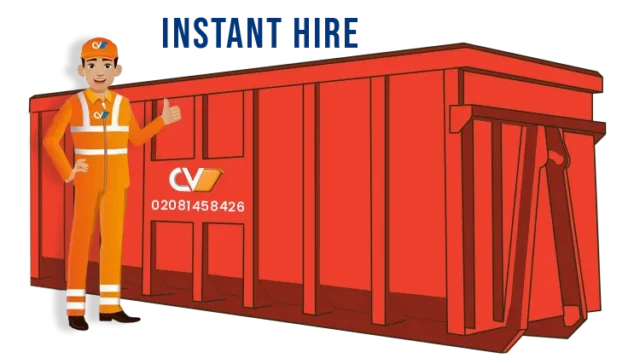If you are looking for an answer about Does Skip Hire Come Under CIS? Then the answer is Yes, Skip Hire Come Under CIS Construction Industry Scheme in the UK. If a skip hire company is involved in construction-related activities, it may need to register for CIS to comply with tax regulations and ensure proper tax deductions on payments made within the construction industry. Let’s go into further detail to discuss in detail:
1. Overview of Skip Hire Services:
Skip-hire services play a pivotal role in construction projects and waste management. These services involve the rental of skips, facilitating the efficient removal of construction waste. As a key aspect of the construction process, skip-hire services may have implications under CIS.
2. Skip Hire Come Under CIS Applicability:
The services classification of Skip Hire Come Under CIS depends on specific circumstances and criteria. The following factors can help determine whether skip-hire services are included in the scope of CIS:
a. Nature of Work:
Skip-hire services directly related to construction activities are more likely to fall under CIS. If the skip hire is associated with construction, alteration, repair, or demolition work, it is likely to be included.
b. Connection to Construction Operations:

If the skip hire is an integral part of construction operations, it is likely to be subject to CIS. For example, skips are predominantly used on construction sites for waste disposal related to construction activities.
c. Contracting Structure:
The contractual arrangement can influence whether skip-hire services are within CIS. If the service provider is considered part of the construction project and operates under a construction contract, CIS may apply.
d. Labour Contribution:
If the skip hire service involves a significant element of manual labour or is closely linked to the on-site workforce engaged in construction, it may be deemed as part of the construction operations.
e. HMRC Guidance:
Checking the guidance provided by HM Revenue & Customs (HMRC) is essential. HMRC offers specific guidelines and criteria for determining whether a particular service falls within the scope of CIS.
Call Now For Affordable Pricing 02081458426
f. Exclusions and Exceptions:
Some services within the construction sector may be exempt from CIS. It’s important to be aware of any exclusions or exceptions that may apply to skip-hire services.
g. Professional Advice:

Seeking professional advice, such as consulting with tax experts or accountants familiar with CIS regulations, can provide clarity on the specific status of skip hire services about CIS.
Businesses operating in the skip-hire sector should carefully assess their operations against these criteria and seek guidance to ensure compliance with CIS regulations. It’s crucial to stay informed about any updates or changes in HMRC guidelines that may affect the classification of skip-hire services under CIS.
3. Tax Implications:
The Construction Industry Scheme (CIS) is a tax deduction scheme in the UK that applies to payments made by contractors to subcontractors in the construction industry, including skip-hire services. The scheme is designed to ensure that tax is deducted at source, helping to prevent tax evasion.
In the context of skip-hire services under CIS, both contractors and subcontractors need to be aware of the specific tax implications. Here’s an overview of how CIS deductions are calculated and applied in the skip-hire industry:
Contractors:

Verification of Subcontractors:
Before making payments, contractors must verify the subcontractors they engage with. This involves checking their registration status with HM Revenue and Customs (HMRC).
If a subcontractor is registered under CIS, the contractor will deduct tax from their payments.
Deduction Rates:
The standard deduction rate is 20%, but this can vary based on the subcontractor’s tax status.
Higher deduction rates (30%) may apply if the subcontractor is not registered with HMRC or if the contractor cannot verify their status.
Book a Call Online 02081458426
Calculating Deductions:
Deductions are calculated as a percentage of the gross payment made to the subcontractor.
For example, if a subcontractor is paid £1,000, the contractor deducts £200 (20%) before making the payment.
Record-Keeping:
Contractors must keep accurate records of all payments and deductions made under CIS.
These records are important for compliance and for providing information to HMRC when required.
Subcontractors:

Registration:
Subcontractors in the skip-hire industry should register for CIS with HMRC.
Registration allows them to benefit from lower deduction rates and ensures compliance with tax regulations.
Deduction Rates:
The deduction rates applied by contractors can vary, but subcontractors can apply for a lower deduction rate based on their tax status.
The application for a lower deduction rate is made to HMRC, and if approved, the contractor will deduct tax at the agreed-upon rate.
Claiming Tax Back:
Subcontractors can claim back any overpaid tax when they file their annual tax return.
Subcontractors need to keep records of all payments received, including deductions made under CIS.
Compliance:
Subcontractors must ensure they comply with CIS regulations to avoid higher deduction rates and other penalties.
This includes timely registration, providing accurate information to contractors, and keeping proper records.
In short, skip-hire services under CIS involve contractors deducting tax from payments to subcontractors. Contractors must verify subcontractors’ registration, apply the correct deduction rates, and maintain accurate records. Subcontractors, in turn, should register for CIS, apply for lower deduction rates if eligible, and ensure compliance to claim back any overpaid tax during the annual tax return process. Both parties need to be aware of the financial implications and regulatory requirements to operate within the framework of the CIS.
4. Regulatory Compliance for Skip Hire Companies under CIS:
Registration with HMRC:
Contractors: Must register for the Construction Industry Scheme (CIS) with HM Revenue and Customs (HMRC). This includes skip-hire companies that engage subcontractors.
Subcontractors: Subcontractors in the skip-hire sector must also register for CIS to ensure proper tax treatment.
Verification of Subcontractors:
Contractors: Before making payments, contractors must verify the registration status of subcontractors with HMRC. This is crucial to determine the correct deduction rates.
Subcontractors: Ensure timely and accurate registration with HMRC to be recognized as eligible for lower deduction rates.
Deduction Rates:
Contractors: Apply the correct deduction rates (20% standard, or higher rates for unregistered subcontractors) when making payments. Ensure compliance with the specified rates to avoid penalties.
Subcontractors: Apply for lower deduction rates if eligible, based on tax status. This involves submitting the necessary information to HMRC for assessment.
Record-Keeping:
Contractors and Subcontractors: Maintain accurate records of all transactions, payments, and deductions made under CIS. Records should include details such as subcontractor verification, payment amounts, and tax deductions.
Retention Period: Keep records for at least six years, as HMRC may conduct audits or request information within this timeframe.
Compliance Checks:
HMRC Inspections: Be prepared for compliance checks and inspections by HMRC. This may include providing documentation to verify the correctness of payments, deductions, and subcontractor information.
Prompt Cooperation: Cooperate promptly with any requests from HMRC during compliance checks.
Communication and Reporting:
Contractors: Communicate CIS deductions clearly to subcontractors on payment statements. Ensure accurate reporting to HMRC through monthly CIS returns.
Subcontractors: Verify that payment statements accurately reflect CIS deductions. Report any discrepancies to the contractor and HMRC.
Penalties and Enforcement:
Non-Compliance Penalties: Non-compliance with CIS regulations, including failure to verify subcontractors or incorrect deduction rates, may result in penalties.
Appeals Process: Understand the appeals process in case of disputes or disagreements with HMRC decisions.
Training and Awareness:
Contractors and Subcontractors: Ensure that relevant personnel are trained and aware of CIS regulations. This includes understanding deduction rates, verification procedures, and record-keeping requirements.
Annual Tax Returns:
Subcontractors: Include CIS-related information in annual tax returns. This allows subcontractors to claim back any overpaid tax during the tax return process.
Updates and Changes:
Stay Informed: Keep abreast of any updates or changes to CIS regulations. Regularly check HMRC guidelines for the latest information to ensure ongoing compliance.
Compliance with CIS regulations is essential for skip-hire companies to avoid legal issues, and financial penalties, and to maintain a smooth operation within the construction industry. Regularly reviewing and updating internal processes in line with HMRC guidelines is crucial to ensuring ongoing regulatory compliance.
5. Exemptions or Exceptions:

There aren’t specific exemptions for skip hire services under the Construction Industry Scheme (CIS) in the UK. However, some considerations and nuances may affect the application of CIS in certain situations within the skip-hire industry. It’s important to note that regulations may change, and it’s advisable to consult with a tax professional or refer to the latest guidelines from HM Revenue and Customs (HMRC) for the most current information.
Considerations and Nuances:
Material Supply Only:
If a skip hire company is involved solely in the supply of skips without providing labour, the CIS may not be applicable. However, if the company also provides labour (e.g., drivers for skip delivery), CIS regulations may come into play.
Self-Employed Status:
Individuals who provide skip-hire services as self-employed may have different tax implications compared to those operating as limited companies. Self-employed individuals may be subject to CIS deductions when working for contractors, while limited companies may need to consider the company’s status under CIS.
Private Customers:
Skip-hire services provided to private customers or non-business entities may not fall under the scope of CIS. However, when providing services to construction contractors or subcontractors, CIS regulations are more likely to apply.
Transport-Only Services:
Companies that exclusively provide transport services for skips without involvement in the construction or installation process may have different CIS considerations. It’s essential to clarify the nature of the services provided to determine the applicability of CIS.
Temporary Structures:
If the skips are considered temporary structures rather than permanent fixtures, there might be differences in the application of CIS regulations. This could depend on the nature of the construction project and the use of skips within that context.
Specialized Skip Services:
Companies offering specialized skip services, such as hazardous waste removal or handling specific types of materials, may face unique considerations. The nature of the service provided can influence the application of CIS regulations.
Small Contracts Exemption:
The Small Contracts Exemption allows contractors to pay subcontractors without deducting CIS if the average annual expenditure on construction operations is below a certain threshold. However, this exemption is subject to specific conditions, and skip-hire companies should assess their eligibility.
Important Considerations:
Legal Advice: Skip-hire companies should seek legal and tax advice to understand how CIS regulations specifically apply to their operations. This is especially important if their services involve a combination of skip supply, transport, and labour.
HMRC Guidance: Regularly check HMRC guidance and updates for any changes to CIS regulations that may impact skip-hire services.
Skip-hire companies must assess their specific circumstances and seek professional advice to ensure compliance with CIS regulations, taking into account any industry-specific nuances or exemptions that may apply.
6. Benefits and Challenges:
Benefits for Skip Hire Companies Operating Under CIS:
CIS Skip-Hire Companies: Benefits and Challenges
| Benefits of CIS | Challenges of CIS |
|---|---|
|
|
a. Access to Contracts:
Compliance with CIS regulations allows skip-hire companies to participate in construction projects where CIS is a requirement. This expands business opportunities and provides access to a larger pool of potential contracts.
b. Industry Credibility:
Being CIS-compliant enhances the credibility of skip-hire companies within the construction industry. Compliance signals professionalism and adherence to legal and regulatory standards, potentially attracting more business partners.
c. Reduced Tax Evasion Risk:
CIS helps mitigate the risk of tax evasion within the construction sector. By deducting taxes at source, it contributes to fair and transparent financial transactions, reducing the likelihood of non-compliance issues.
d. Legal Protection:
Compliance with CIS regulations provides legal protection for skip-hire companies. It reduces the risk of penalties, fines, or legal action by HMRC, contributing to a more stable and secure business environment.
e. Transparent Financial Transactions:
CIS requires detailed record-keeping and transparent financial transactions. This can lead to improved financial management, accurate accounting, and better decision-making within the skip-hire business.
f. Collaborative Relationships:
Compliance fosters positive relationships within the construction ecosystem. Contractors are more likely to engage with skip-hire companies that adhere to CIS regulations, promoting trust and reliability in business partnerships.
Challenges for Skip Hire Companies Operating Under CIS:
g. Administrative Burden:
Compliance with CIS involves administrative tasks such as verification of subcontractors, record-keeping, and regular reporting. The additional administrative burden may require resources and time, impacting overall operational efficiency.
h. Cash Flow Impact:
Deducting taxes at source can affect the cash flow of skip-hire companies, as they receive payments net of CIS deductions. Managing cash flow becomes critical, especially for smaller businesses with tight financial margins.
i. Higher Costs for Contractors:
For contractors engaging in skip-hire services, the deduction of CIS can increase the overall cost of the project. This may impact the competitiveness of skip-hire companies in bidding for contracts and necessitate careful consideration of pricing strategies.
j. Non-Compliance Risks:
Failure to comply with CIS regulations can result in penalties, fines, or other legal consequences. Skip-hire companies need to stay vigilant and invest in ensuring ongoing compliance to avoid potential financial and reputational risks.
k. Impact on Subcontractor Relationships:
Subcontractors may perceive CIS deductions as reducing their take-home pay. This can strain relationships between skip-hire companies and subcontractors, particularly if subcontractors are not fully informed about the deductions and their eligibility for lower rates.
l. Complexity of Deduction Rates:
The complexity of CIS deduction rates, which can vary based on subcontractor status, may pose challenges for skip-hire companies in accurately calculating and applying deductions. This complexity may require ongoing training and awareness for staff involved in financial management.
m. Market Competition:
In a competitive market, compliance with CIS can be a standard requirement. However, it may also create challenges in standing out from competitors, as many companies within the construction sector are subject to similar regulatory standards.
Overall Impact: In short, operating under CIS can offer skip-hire companies significant benefits in terms of industry access, credibility, and legal protection. However, it also presents challenges related to administrative tasks, cash flow, and potential strains on relationships within the construction ecosystem. Successful navigation of these challenges requires a strategic approach to compliance, financial management, and communication with subcontractors and other stakeholders. Ultimately, the impact of CIS on skip-hire companies depends on their ability to balance the benefits and challenges while maintaining a commitment to regulatory compliance and industry standards.
Conclusion:
The Construction Industry Scheme (CIS) is vital for regulating financial transactions in the UK’s construction industry, including skip-hire services. Complying with CIS offers skip-hire companies access to contracts, industry credibility, and legal protection. However, it brings administrative burdens and potential cash flow impacts. Success requires careful financial management, ongoing compliance, and transparent communication with subcontractors. Striking this balance is crucial for navigating the complexities of CIS and thriving in the competitive construction ecosystem.
Call Now For Affordable Pricing 02081458426
Frequently Asked Questions (FAQ’S)
1. Why is compliance with the Construction Industry Scheme (CIS) important for skip-hire companies?
Compliance with CIS is crucial for skip-hire companies as it ensures fair financial transactions, industry credibility, and access to a broader range of contracts within the construction industry. It also protects against tax evasion risks and legal repercussions, fostering transparent and collaborative relationships.
2. How does CIS impact the cash flow of skip-hire companies?
CIS can impact cash flow for skip-hire companies as contractors deduct taxes at source before making payments to subcontractors. This means skip-hire companies receive payments net of CIS deductions, requiring careful cash flow management, especially for smaller businesses with tight financial margins.
3. Are skip-hire services always subject to CIS regulations?
The applicability of skip-hire services under CIS depends on factors such as the nature of work, contracting structure, labour contribution, and adherence to HMRC guidance. While some exclusions or exceptions may apply, skip-hire companies are advised to seek professional advice and regularly check HMRC guidelines to ensure compliance with CIS regulations.
